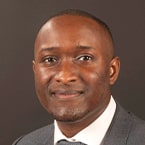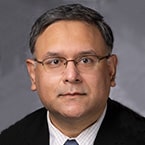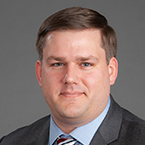AACR-Novocure Career Development Awards for Cancer Research
The AACR-Novocure Career Development Awards for Cancer Research represent a joint effort to promote and support early-career investigators who are conducting innovative research focused on Tumor Treating Fields. These grants are intended to provide a deeper understanding of the mechanisms of action of this anti-cancer treatment modality and to accelerate the development of new treatment strategies to advance therapeutic options for cancer.
2024 grantee

Research
Translating Tumour Treating Fields with Targeted DNA Repair Inhibitors Towards Clinical Strategy(TACTICS) is designed to establish the UK’s first full-circle translational platform to advance Tumor Treating Fields (TTFields)-based combinations for cancers of unmet need. Among these, high-grade gliomas cause over 190,000 deaths annually worldwide, resulting in more years of life-loss per patient than any other cancer. Tumor heterogeneity and glioma stem cell (GSC) subpopulations, which repair DNA rapidly after chemotherapy and radiotherapy, make it unlikely that any single treatment will provide a cure. Within TACTICS, Dr. Rominiyi plans to evaluate TTFields-DNA repair inhibitor (TD) combinations in subcutaneous, bespoke orthotopic brain-invasive, and immunocompetent mouse models to support rapid translation to clinical trials. Additionally, focused analyses of murine and patient tissue following TTFields and immunotherapy will be used to guide the development of TTFields-DNA-repair-immuno-oncology combinations, advancing global efforts to improve outcomes for these devastating malignancies.
Biography
Dr. Rominiyi studied medicine at the University of Manchester before completing house officer (intern) posts in Cambridge and Oxford. In 2014, he secured a neurosurgical training position (residency) in Sheffield, where he developed strong research interests and pursued laboratory-based doctoral research on targeting DNA repair in glioblastoma. He developed new spatially distinct, patient-derived models to establish the Sheffield ‘Living Biobank’ of Glioblastoma.
Acknowledgement of Support
“This AACR-Novocure Career Development Award for Cancer Research will be instrumental in my progression as a surgeon-scientist aspiring to improve patient care through both laboratory-based and clinical studies. The Award, and the support of our phenomenal team, will enable us to deliver new treatment approaches for some of the deadliest cancers.”
2023 GRANTEE

Research
Spinal metastases are treated with radiotherapy alone or in combination with surgery. Despite these interventions, tumors frequently recur, treatment options are limited, and patients experience exceptionally high rates of tumor progression and neurologic compromise. There is an urgent clinical need to develop novel alternative treatments for radiation refractory spinal metastases. While tumor treating fields (TTFields) possess tumor suppressive effects against multiple tumor histologies, they are also influenced by the electrical conductivity of each tissue layer in proximity to the tumor. In this setting, the anatomic features of bone provide a potential therapeutic advantage for the application of TTFields against spinal metastases. This work will leverage a series of in vitro, ex vivo, and in vivo studies that will decipher the unique cellular cross talk between the tumor—bone microenvironment in the setting of TTFields.
Biography
Dr. Alvarez-Breckenridge was a member of the Medical Scientist Training Program (MSTP) at The Ohio State University where he received his combined medical and doctoral degree and researched oncolytic viral therapy for gliomas. He subsequently completed his neurosurgery residency at Massachusetts General Hospital and conducted research on immunotherapy for brain metastases and leptomeningeal disease. He pursued a neurosurgical oncology fellowship at The University of Texas MD Anderson Cancer Center and joined the faculty in 2020 as an assistant professor. His clinical practice focuses on treating spinal tumors and he leads a laboratory studying novel treatment approaches for brain and spine metastases.
Acknowledgement of Support
“This award is an incredibly valuable resource to expand the research scope and capability of my laboratory, particularly as we a) strive to achieve novel insights into the utility of TTFields for spinal metastases, b) decipher underlying mechanisms of action within the bone context, and c) move towards clinical investigation.”
2022 Grantee

Research
Tumor treating fields (TTFields) have been shown to prolong median overall survival and increase the survival rate of glioblastoma patients, when combined with adjuvant chemotherapy. Yet, the mechanisms by which TTFields potentiate the effects of chemotherapy are not completely understood. TTFields have been shown to permeabilize cancer cell membranes, thereby increasing access of therapies and diagnostic probes into cancer cells. Dr. Patel’s lab is set to: identify cell-specific permeabilization frequencies of TTFields; determine the kinetics and durability of the cell membrane permeabilization effect under TTFields exposure; and quantitate the amount of chemotherapy that gains access into TTFields-exposed cancer cells.
Biography
Chirag Patel earned BS/MSE degrees in biomedical engineering from Johns Hopkins University prior to completing MD/PhD training at The University of Texas MD Anderson Cancer Center (MDACC) UTHealth Graduate School of Biomedical Sciences (GSBS) and McGovern Medical School. After adult neurology residency at UCLA, he completed his training at Stanford as a postdoctoral fellow in molecular imaging and clinical neuro-oncology fellow. After two years on faculty in the Stanford neurology and radiology departments, he was recruited to MDACC. He is an assistant professor of neuro-oncology and a McNair Scholar. He is also affiliated with the Neuroscience and Cancer Biology PhD programs at the GSBS.
Acknowledgement of Support
I am grateful to receive this critical early support in my career development that will also provide an opportunity for me to mentor trainees in the lab. As a result of this award, we can further the understanding of TTFields-induced cancer cell membrane permeabilization, which could result in improved delivery of anti-cancer therapies.
2021 Grantees

Research
Glioblastoma is the most common primary malignant brain tumor in adults and has a dismal prognosis despite an aggressive treatment regimen. Tumor Treating Fields (TTFields) are a novel noninvasive treatment modality utilizing alternating electric fields demonstrating an increase in overall survival. More research is needed to fully understand the mechanism, timing, and sequence of TTFields-induced effects to further improve its efficacy. Dr. Borst’s group plans to conduct advanced time lapse experiments and use clinically relevant animal models to establish the impact of TTFields on cell cycle duration/ transitions, cell morphology, and cell death.
Biography
Dr. Borst obtained his MD at the University of Antwerp and his PhD at the University of Amsterdam. He completed his clinical training in the Department of Radiation Oncology at the Netherlands Cancer Institute. After additional training at the Hokkaido University, Japan, the Institute of Cancer Research, U.K., the Princess Margaret Cancer Centre, Canada, and the University of California, San Francisco, Dr. Borst developed his translational research group investigating novel insights in the treatment response of brain tumors. He now holds a clinical-academic position at the University of Manchester and The Christie NHS Foundation Trust.
Acknowledgment of Support
The AACR-Novocure Career Development Award will enable the setup of advanced research elucidating insights for further knowledge and improvement of efficacy of TTFields treatment. This work will subsequently lead to novel translational studies that are needed to improve the treatment outcome of patients with brain tumors.

Research
Tumor Treating Fields (TTFields) are thought to exhibit primarily anti-mitotic effects on cancer cells. However, recent data supports an emerging role of TTFIelds in modulating cancer cell-extracellular matrix (ECM) phenotypic biophysics. Using primary and metastatic brain tumor 3D culture systems, live-cell microscopy imaging, and data-derived mechanistic computational modeling, Dr. Weis aims to 1) characterize the biophysical response to TTFields, 2) determine the effects of TTFields on the ECM structural architecture and mechanical stiffness, and 3) identify stromal influences that potentiate response to TTFields.
Biography
Dr. Weis received his BS in biomedical engineering from Washington University in St. Louis and his MS and PhD in biomedical engineering from Vanderbilt University. He was a postdoctoral fellow at the Vanderbilt University Institute of Imaging Science and a research assistant professor of biomedical engineering at Vanderbilt University prior to joining Wake Forest. He is currently an assistant professor of biomedical engineering at Wake Forest School of Medicine. His research group seeks to develop novel analysis approaches in cancer – combining mechanistic computational modeling with non-invasive imaging data to explore the response to cancer therapy.
Acknowledgment of Support
I am honored to receive this AACR-Novocure Career Development Award for Tumor Treating Fields Research. This award will support and promote my research using hybrid experimental and computational approaches to better understand TTFields therapy response. This early-career investigator support is invaluable for establishing my career as a cancer researcher.